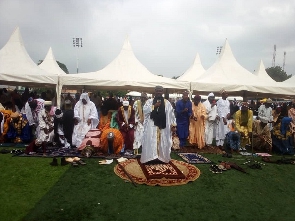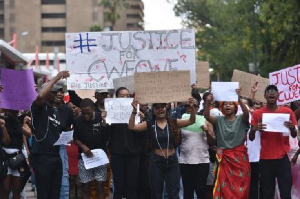Among the Muslim community worldwide, Zul-Hijjah- is regarded as the MONTH OF SACRIFICE. It is the 12th and the final month of the Islamic Lunar calendar.
It marks the end of the year 1444.
The first day of the first month of the Eid-Ul-Adha is meant for supplications/praises of Allah and Muslims in Hajj performing their acts of worship are also in constant supplication/praises of Allah.
The first ten days of Zhul-Hijjah are considered to be the best days of the year.
The Prophet (peace and blessings of Allah be upon him) said: “There are no days on which righteous deeds are more beloved to Allah than these ten days.” [Bukhari]
During these days, Muslims around the globe recite the Holy Qur’an, fast, preserve ties of kinship, increase their good deeds, and offer charity among others
The ninth day before the Eiddi-Adha is called the day of ARAFAH, meaning to know.
Immediately after the Fajr Sualaat, the dawn prayers, Muslims recite the following in glorification of their Creator.
The Day of Arafah is particularly important in the Islamic Calendar because it is the day the Prophet Muhammad [Peace be unto him] gave his farewell sermon upon Mount Arafah to many Muslims with whom he completed Hajj. It also commemorated the finality of the religion of Islam, as well as the Divine revelation near the end of his life.
While the Prophet Muhammad stood on the plain of Arafah, verse 5:3 of the Qur’an was revealed to him.
During the festive season, dead animals, blood, the flesh of swine, and anything that has been dedicated to things other than Allah are prohibited.
Animals killed by strangling, violent blow, head-on fall, or by the goring of horns and those from which wild animals have preyed are also prohibited.
Preferably, healthy animals slaughtered are sacrificed on stone altars, and [prohibited is] that you seek decision through divining arrows. That is grave disobedience.
This day those who disbelieve have despaired of [defeating] your religion; so fear them not, but fear Me. This day I have perfected for you your religion and completed My favor upon you and have approved for you Islam as religion. But whoever is forced by severe hunger with no inclination to sin - indeed, Allah is Forgiving and Merciful. [Holy Qur’an 5:3].
Lailaha illalahu wahadahu lasharikalahu lahulmulku walahu hamdu wahuva alakulli shayin kadir.”
It translates as follows, ”There is no God but Allah alone Who has no partner, to whom dominion belongs, to whom praise is due, and who has power over anything.” It is the Sunnah of our Prophet Mohammed (PBUH) to recite Tahleel (‘Laillaha illalah’), Takbeer (‘Allahuakbar’), Tahmeed (‘Alhamdulillah), and Tasabeeh(‘Subhanallah’) as many times as possible on this day.
It’s also a day of immense forgiveness with an opportunity for great reward.
A day of freedom from the fire where Muslims around the globe fast, except the Pilgrims doing Hajj, who do not have to fast on that day.
THE CONCEPT OF SACRIFICE
If prophet Ibrahim [May Allah be pleased with him] had sacrificed his son Ismail centuries ago, every Muslim would have been jeering towards the sacrificing of his/her son, on Wednesday the 28th of June 2023 which is the 10th day of Zul-Hijjah, the 12th and final month in the Islamic lunar calendar marking the end of the year 1444.
“(Abraham prayed:) My Lord, grant me a doer of charitable deeds. So, We gave him the good news of a forbearing son. But when he became of age to work with him, he said: O my son, I have seen in a dream that I should sacrifice you; so, consider, what is your view. He said: O my father, do as you are commanded, if Allah please, you will find me patient.
So, when they had both submitted and he had thrown him down upon his forehead, We called out to him saying, O Abraham, you have indeed fulfilled the vision. Thus, do We reward the doers of good? Surely this is a manifest trial. And We ransomed him with a great sacrifice.” (37:100–107)
It was prophet Ibrahim’s [May Allah be pleased with him] known as Abraham (Christians and Jews) willingness to adhere to the command of Allah to sacrifice his only son that, Allah provided him with a ram for the sacrifice instead.
Because of his obedience to Allah, Muslims around the globe sacrifice animals in commemoration of that. It also signifies a broader Islamic doctrine of following all the prophets sent by Allah not only prophet Muhammed [Peace be unto him]
The Eiddil-Adha is known around the world as the “Festival of Sacrifice” known in other languages among the Turkish and Middle Asian Muslims as “Qurbaan“and among the Arabs as “Udihiyya.” In a cosmopolitan nation like Ghana with different tribal languages, the Dagombas and Hausa-speaking people call it “Layyah” whiles the Akan-speaking people call it “Donyi.”
This Eddil-Adha is celebrated on the 10th day of Zul-Hijjah, the 12th and final month in the Islamic lunar calendar marking the end of the year 1444, which is also the 3rd day of Hajj Which began on Monday the 26th of June].
The Eddil-Adha celebration lasts for four days [Wednesday, Thursday, Friday, and Saturday after the Asr sualaat, the afternoon prayers] with the following glorification: Allahu Akbar Allahu Akbar La Ilaha Ilallah Wallahu Akbar Allahu Akbar Wa Lillahil Hamd.
Meaning: Allah is the greatest, Allah is the greatest. There is no deity (no god) besides Allah and Allah is the greatest. Allah is the greatest and to Allah, all praises belong.
Domestic animals like ram, goat, cow, and camel are the preferred animals for the sacrifice. As old as a one-year ram/goat can be used for the sacrifice, while two years for a bull and five years for camels. Since Islam takes care of differences in wealth, as many as seven people can pull their resources together to sacrifice a bull/camel.
The animals to be sacrificed should be in their natural states; free from artificial defects like castration and or blindness, sickness, horn broken from the root, broken limbs, one-eyed, defective teeth/falling teeth, ear has been uprooted so much that it is hanging outwardly, an animal with a slit leaving it hanging etc.
The sacrifice takes place after the Eiddil-Adha prayer, which is, after sunrise till sunset.
It is also recommended that knives are sharpened to spare the agony animals go through when they are slaughtered for the occasion.
Just a stroke of the knife should be able to slaughter the animal.
The festival continues from the day of the Eiddil-Adha celebration to the next three days. The Eid day is Wednesday, and the other three days Thursday, Friday, and Saturday are for the distribution/sharing of the meat.
The meat of the animal is divided into three parts. One-third for the household, one-third for families and friends, and then the other one-third for the poor/less privileged who could not afford to sacrifice.
The concept of sharing is for the poor/less privileged.
You can decide to share with them if you have more than enough to eat or buy the animals for them to sacrifice for themselves.
The Eid-Ul-Adha also reminds us of the prohibition of human sacrifice in any way.
Allah prohibits the killing of human beings whether young or old. Even though the sacrifice is for Allah’s sake, Allah is sufficient and does not need to be fed. It is for our own good for cleansing our souls for piety.
The economic impart of Eid-Ul-Adha
There is always booming trade and economic consequences where merchants in rice, oil etc, and farmers in animal rearing industries from all occupations position themselves to make sales. Each year brings its own increments in live stocks.
Last year in the Ashanti Region, the price of a ram ranged from 1000 Ghana cedis to 2000 Ghana cedis, and the highest purchase of a ram was 2500 Ghana cedis whereas a bull was between 6000 to 12000 Ghana cedis and the highest purchase of a bull estimated to be over 30,000 Ghana cedis.
This year is seeing an increment with prices of a ram ranging from 1500 to 2500 Ghana cedis and the highest purchase of a ram is 5,000 Ghana cedis, whereas the price of a bull ranges from 8000 Ghana cedis with the highest purchase of 40,000 Ghana cedis.
However, last year in the Greater Accra Region, the cost of ram ranged from 1500 Ghana cedis to 2500 Ghana cedis whereas a bull ranged from 12000 to over 40,000 Ghana cedis. Also, nearly 15,000 animals are estimated to be slaughtered in this year’s Eiddil-Adha. This year’s prices are also surging with a ram ranging from 2000 to 3500 Ghana cedis whereas a bull range from 25000 to 32000 with the highest price being 55000 Ghana cedis.
Opinions of Wednesday, 28 June 2023
Columnist: Akepae Michael Adombila















